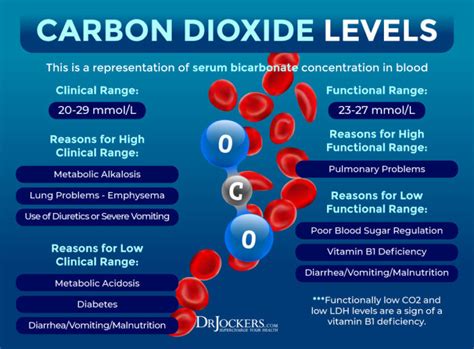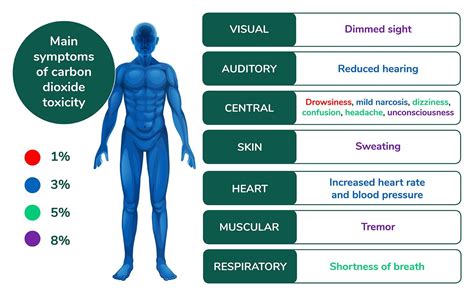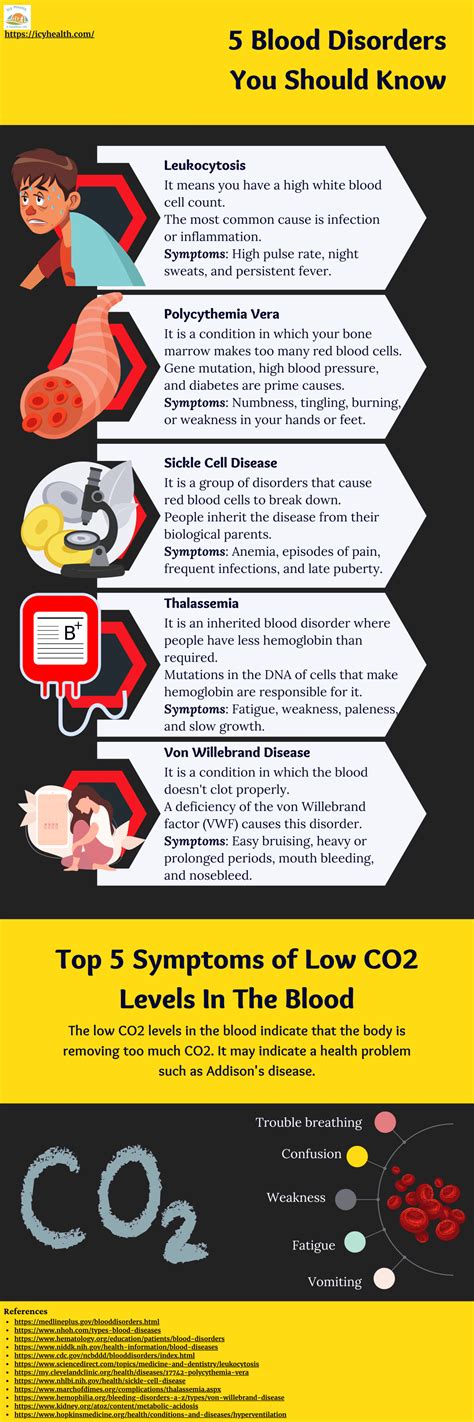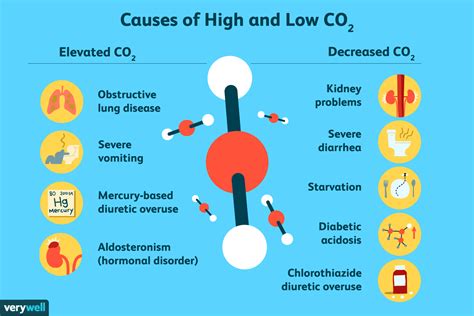Intro
High levels of carbon dioxide in the blood, also known as hypercapnia, can be a serious health concern. Carbon dioxide is a waste product that is normally removed from the body through exhaling. However, when the body is unable to remove excess CO2, it can lead to a range of health problems. In this article, we will explore the causes, symptoms, and treatment options for high CO2 levels in the blood.
The importance of maintaining normal CO2 levels in the blood cannot be overstated. When CO2 levels become too high, it can lead to respiratory acidosis, a condition where the blood becomes too acidic. This can cause a range of symptoms, including headaches, confusion, and fatigue. In severe cases, high CO2 levels can lead to respiratory failure, which can be life-threatening. Therefore, it is essential to understand the causes of high CO2 levels and take steps to prevent them.
High CO2 levels in the blood can be caused by a range of factors, including respiratory problems, such as chronic obstructive pulmonary disease (COPD) or pneumonia. Other causes include obesity, sleep apnea, and neuromuscular disorders, such as muscular dystrophy. In some cases, high CO2 levels can be caused by certain medications, such as sedatives or anesthetics. Understanding the underlying cause of high CO2 levels is crucial in developing an effective treatment plan.
Causes of High CO2 Levels in the Blood

There are several causes of high CO2 levels in the blood. These include:
- Respiratory problems, such as COPD or pneumonia
- Obesity
- Sleep apnea
- Neuromuscular disorders, such as muscular dystrophy
- Certain medications, such as sedatives or anesthetics
- High altitude
- Anesthesia
Respiratory Problems
Respiratory problems, such as COPD or pneumonia, can cause high CO2 levels in the blood. These conditions can damage the lungs and make it difficult for the body to remove excess CO2.Obesity
Obesity can also cause high CO2 levels in the blood. Excess weight can put pressure on the lungs and make it difficult for the body to breathe properly.Sleep Apnea
Sleep apnea is another cause of high CO2 levels in the blood. This condition causes a person to stop breathing for short periods during sleep, which can lead to a buildup of CO2 in the blood.Symptoms of High CO2 Levels in the Blood

The symptoms of high CO2 levels in the blood can vary depending on the underlying cause. However, common symptoms include:
- Headaches
- Confusion
- Fatigue
- Shortness of breath
- Rapid heartbeat
- Chest pain
Mild Symptoms
Mild symptoms of high CO2 levels in the blood may include headaches and fatigue. These symptoms can be mistaken for other conditions, such as migraines or depression.Severe Symptoms
Severe symptoms of high CO2 levels in the blood can include confusion, shortness of breath, and chest pain. These symptoms require immediate medical attention.Treatment Options for High CO2 Levels in the Blood

Treatment for high CO2 levels in the blood depends on the underlying cause. However, common treatment options include:
- Oxygen therapy
- Medications, such as bronchodilators or steroids
- Lifestyle changes, such as weight loss or quitting smoking
- Respiratory therapy, such as inhalers or ventilators
Oxygen Therapy
Oxygen therapy is a common treatment for high CO2 levels in the blood. This involves breathing in oxygen through a mask or tube, which can help to reduce CO2 levels in the blood.Medications
Medications, such as bronchodilators or steroids, can help to treat underlying respiratory problems that are causing high CO2 levels in the blood.Lifestyle Changes
Lifestyle changes, such as weight loss or quitting smoking, can also help to reduce high CO2 levels in the blood. These changes can improve lung function and reduce the risk of respiratory problems.Prevention of High CO2 Levels in the Blood

Preventing high CO2 levels in the blood is crucial in reducing the risk of respiratory problems. Ways to prevent high CO2 levels include:
- Maintaining a healthy weight
- Quitting smoking
- Avoiding high altitudes
- Getting regular exercise
- Eating a healthy diet
Maintaining a Healthy Weight
Maintaining a healthy weight can help to reduce the risk of high CO2 levels in the blood. Excess weight can put pressure on the lungs and make it difficult for the body to breathe properly.Quitting Smoking
Quitting smoking can also help to reduce the risk of high CO2 levels in the blood. Smoking can damage the lungs and make it difficult for the body to remove excess CO2.Complications of High CO2 Levels in the Blood

High CO2 levels in the blood can lead to a range of complications, including:
- Respiratory failure
- Cardiac arrest
- Seizures
- Coma
- Death
Respiratory Failure
Respiratory failure is a serious complication of high CO2 levels in the blood. This occurs when the lungs are unable to remove excess CO2, leading to a buildup of acid in the blood.Cardiac Arrest
Cardiac arrest is another complication of high CO2 levels in the blood. This occurs when the heart is unable to pump blood effectively, leading to a lack of oxygen in the body.What are the symptoms of high CO2 levels in the blood?
+The symptoms of high CO2 levels in the blood can vary depending on the underlying cause. However, common symptoms include headaches, confusion, fatigue, shortness of breath, rapid heartbeat, and chest pain.
How is high CO2 levels in the blood treated?
+Treatment for high CO2 levels in the blood depends on the underlying cause. However, common treatment options include oxygen therapy, medications, lifestyle changes, and respiratory therapy.
Can high CO2 levels in the blood be prevented?
+Yes, high CO2 levels in the blood can be prevented by maintaining a healthy weight, quitting smoking, avoiding high altitudes, getting regular exercise, and eating a healthy diet.
In conclusion, high CO2 levels in the blood can be a serious health concern. Understanding the causes, symptoms, and treatment options is crucial in preventing and managing this condition. By taking steps to prevent high CO2 levels and seeking medical attention if symptoms occur, individuals can reduce their risk of complications and improve their overall health. We invite you to share your thoughts and experiences with high CO2 levels in the blood in the comments below.
